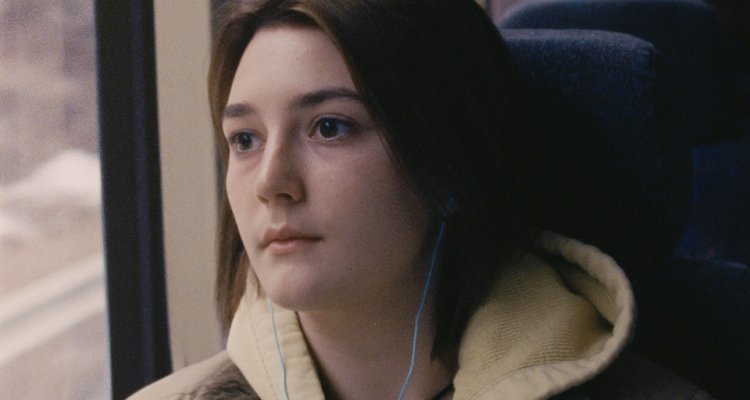Some movies ease you in to the conflict at their center; others airdrop you in to a crisis in progress, and trust you, as a viewer, to catch yourself up. Eliza Hittman’s “Never Rarely Sometime Always” is one of the latter. We meet its protagonist, Autumn (Sidney Flanigan), busting up a fifties-themed variety/talent show at her high school by strumming her guitar, singing an earnest, pain-filled ballad with lyrics like “He makes me do things I don’t wanna do”; she’s heckled by a guy in the audience (quite possibly the guy the song is about), which stops her cold, but just for a moment. And then she roars back, finishing the song with extra bite.
READ MORE: The 25 Most Anticipated Movies Of The 2020 Sundance Film Festival
In other words, she’s already going through some stuff. Autumn is 17, the oldest daughter of a working-class family. She has a combative relationship with her dad, and a mom who’s just trying to play the peacemaker. Soon enough, Autumn’s troubles will get worse: she goes to get a pregnancy test. “That looks like a positive,” the nurse tells her. She goes home, heats up a safety pin, and gives herself a nose piercing. It feels like the gesture it is, a desperate attempt to take control of something.
READ MORE: The 25 Best Movies Of 2020 We’ve Already Seen
Autumn hails from a small town in Pennsylvania, so when she returns for her sonogram, the nurse says things like “This is your beautiful baby,” and describes the heartbeat as “the most magical sound you’ll ever hear.” But Autumn, again, is 17, and is pretty sure she’s not ready to have a baby – a hesitation the nurse greets with an anti-abortion propaganda video. Autumn goes home and starts googling things like “self-induced abortion.”
READ MORE: 52 Films Directed By Women To Watch In 2020
All of this is dramatized in a manner that’s both matter-of-fact and intimate – and quiet, so quiet, unnervingly so, even as we’re seeing and hearing things that would be easier to take if they were smothered in a musical score. Autumn’s cousin and co-worker Skylar (Talia Ryder) finally figures out what’s wrong, and helps her navigate what comes next. (The wordless and unwavering support she offers up is one of the film’s most understated yet moving touches.) They’ll take the Greyhound to New York City, where Autumn can get the procedure without parental consent, and Skylar can take care of her. It should be easy. It is not.
READ MORE: 100 Most Anticipated Films Of 2020
Abortion is something of a third rail in American narrative filmmaking; the occasional documentary will go all in, but most fictions films would rather artfully dodge the specifics, or avoid the topic altogether. That is not the route Hittman takes. The film ‘Never Rarely’ most closely echoes is Cristian Mungiu’s “4 Months, 3 Weeks, and 2 Days” – particularly that film’s willingness to show the specific logistics of these procedures, in meticulous, exhaustive detail.
READ MORE: The 100 Best Films Of The Decade [2010s]
To be clear, abortion is something we should be talking about, in our art and in our world – what a nightmare it is for women to attain this perfectly legal medical procedure, which here involves traveling out of state, bouncing from one facility to another, and spending extra nights in a strange, expensive city. Hittman walks us through every single step, with such focus on the minutiae, it begins to feel like something of a procedural. And then she wallops you.
Hittman last wowed audiences with her 2017 drama “Beach Rats,” but this new film feels like a continuation of her 2013 debut, “It Felt Like Love” – their protagonists share similar flaws and fears, and this almost seems like we’re checking back in a few years later. The people in her movies always look like real people, and act like them too; there’s a real sense of observation in her aesthetic, and an abundance of scenes that feel so private, so personal, that we begin to feel as though we’re imposing by watching them at all. Those were both very good films, but this is her strongest work to date, patiently introducing its characters and conflicts, building up a full head of emotional steam so subtly, you don’t realize what she’s doing until it’s done.
None of which might matter were it not for Flanigan’s astonishing work in the leading role. It is, incredibly, her debut performance, and it’s a stunner – she spends so long hidden behind a wall of teenage angst and ennui that when she lets that guard down, and hints at the real pain inside, it’s devastating. When she lets that mask slip, ever so slightly, Hittman doesn’t give us a way out: she holds on her face, and even though she’s having a conversation, Hittman doesn’t cut away to the other speaker. It takes confidence to shoot a scene like that, and skill to act it that way; as it reached its conclusion, I realized I was holding my breath. So will you. What an extraordinary film this is. [A]
Follow along for all of our coverage from the 2020 Sundance Film Festival here.

